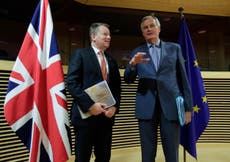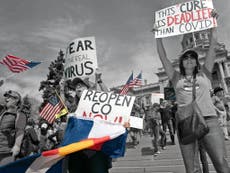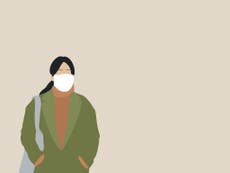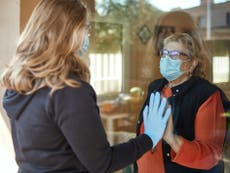So what if we have the highest coronavirus death toll in Europe? At least our commutes are a little more thrilling
Instead of comparing ourselves to other countries, let’s try planets. Each day, Michael Gove can whip out a picture of Saturn and say: ‘It’s full of ice and gas, the UK is doing much better than that’

It’s time to rejoice, we must all travel back to work. We were told this in the prime minister’s wonderfully clear speech, in which he explained “R must be reduced to less than 5 lots of R, except for when R is taking its daily exercise. It is essential that R becomes Q before Christmas 1954. Le chat est sur le table.”
But ideally, you must go back without using public transport, so tomorrow he’ll clarify the rules, saying: ”I suggest you dig a tunnel or ask a member of your household to fire you out of a canon towards your place of work. Or you could float, while maintaining at all times a distance of 2m from birds.”
In the end, most people were too lazy to do anything like that, so they went by bus or underground train, but again the advice was clear: “You must stay 6ft apart on a crowded bus or train, and if there are eight times as many people on the carriage than there needs to be to make it possible to all stand 6ft apart, climb underneath and cling onto to the underside of the train like Bruce Willis in an action film. Or ask your employer to change the way space and distance works, like Einstein did.”
The Department for Transport issued straightforward guidelines for staying safe, which started: “Think about the times and routes that you travel.”
This is a marvellous idea, and it’s amazing no one ever thought of this before. For too long, we’ve all set out on journeys without giving a moment’s thought to the time or route, and that’s why we set off to go to work in Norwich, but end up in Oslo at three in the morning.
Even better, the instructions told us: “If you are on busier services and can’t keep a suitable distance, try to face away from other people.”
Don’t we feel silly now? For months we’ve gone through all this palaver of the whole world staying indoors and queueing up to get in the supermarket when all we needed to do was turn our faces to one side.
The next government advice might as well be: “If that virus comes towards you, don’t be afraid to tell it to piss off.” Or perhaps the Department for Transport will produce an app that suggests Buddhist chants you can recite to process your inner thoughts about the virus.
The lockdown-easing advice also told us to try and wear a face covering “if you can”, which is the sort of decisive instruction we need in a crisis, the sort of thing that made D-Day such a success.
They also told us to try and spend as little time as possible close to other people. It’s important because usually, on a packed bus, everybody stays where they are even when they’ve reached their stop, to savour an extra minute when your faces are all squashed and twisted together, so you all look like a Picasso painting.
The only other detail Boris Johnson had to convey was when this return to work would start, and he was clear it was Monday, which the next day only had to be slightly revised to Wednesday. But that’s a simple mistake to make if you’re translating the days of the week from Latin to English, as the prime minister presumably does.
And then we were left with Johnson’s new slogan, replacing “stay at home” with the more meaningful “stay alert”. Next week it will change again, to “stay afloat, climb every mountain, see it, sine qua non it, sorted”.
It could seem strange we’re asking so many people to return, when the number of new infections here is still three times higher than in any other country in Europe.
But that’s because we’re used to the old thinking, when you made a restriction until the problem you were dealing with went away. For example, if there were 500 crocodiles in the town square, you would keep people indoors until someone had shooed them away.
These days, that’s an outdated way of dealing with problems. It’s much better to say “oh for Christ’s sake, we’ve been sat indoors for ages, and in any case, there are only 400 crocodiles now so they can’t do us any harm. Let’s all go out again.”
Maybe this is why the government has given up comparing our results with other countries.
Until this week, each day they told us the figures for each country in Europe, but this week, they stopped giving them out, coincidentally on the day our figures became the worst of them all.
Johnson said this was because “comparing with other countries doesn’t help”.
This makes sense, because if there’s one country with much better figures than us, there’s no point in seeing what it did so we can learn from it. For example, New Zealand has had no new cases in three days, and towns are opening up again, but it’s much easier for them because they’re full of waterfalls and they do a silly dance before rugby matches so what’s the point in comparing?
Maybe, from now on, we’re going to compare ourselves with other planets. Each day Michael Gove will show us a picture of Saturn and say: “No one can live there, it’s full of ice and gas, we’re doing much better than that.”
So now everyone is clear about the rules. We must stay at home but must go to work; we can’t visit a relative but can have a visit from an estate agent. So, if you want to see your mum, put your house on the market and get her to come and make an offer on it. After that, you’ll be encouraged to join 90 people in a sauna, as long as you turn your face away.







Join our commenting forum
Join thought-provoking conversations, follow other Independent readers and see their replies